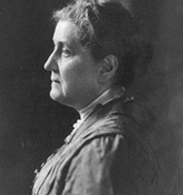Jane Addams was a leading social activist and suffragette of the Progressive era. She is credited with starting the social work profession in the United States and was the first American woman to be awarded the Nobel Peace Prize. Addams was also a co-founder for the American Civil Liberties Union (ACLU).
Early Life
Addams was born into a prosperous Illinois family. Addams, who was an avid reader as a child largely due to her frail health, initially pursued the study of medicine. After health issues prevented her from finishing her training, Starr traveled and studied in Europe. During one of her tours with her friend Ellen G. Starr, the two women visited a settlement house, Toynbee Hall, in London.
The Hull House
In 1889, Addams and Starr founded their own settlement house in Chicago, known as Hull House. As Addams later described, their goal was “to provide a center for a higher civic and social life; to institute and maintain educational and philanthropic enterprises and to investigate and improve the conditions in the industrial districts of Chicago.”
Hull House grew from modest beginnings to a large, well-funded facility that hosted 2,000 visitors every week. A center for education in the community, the Hull House provided kindergarten classes, girls’ and boys’ clubs, and adult education in the evening. It also provided civic, cultural, and recreational opportunities though its meeting spaces, art gallery, gym, bathhouse, library, and public kitchen.
Work in Chicago
In addition to operating the Hull House, Addams served on Chicago’s Board of Education and became the first woman president of the National Conference of Charities and Corrections. She was also involved in a number of social causes, leading investigations on midwifery, child labor, and sanitary conditions, which led to her appointment as garbage inspector of the Nineteenth Ward. An ardent feminist, Addams argued that women had a civic duty outside of the family.
Politics
Politically, Addams was a progressive, campaigning for Theodore Roosevelt. Addams was also a pacifist and advocated against America’s entry into World War I. She was the leader of the Women’s Peace Party in America and later became the president of the Women’s International League for Peace and Freedom. During the war, she worked with Herbert Hoover to provide relief supplies to the women and children of the enemy nations, an experienced that she chronicled in her book Peace and Bread in Time of War. For her efforts, she shared the 1931 Nobel Peace Prize.









